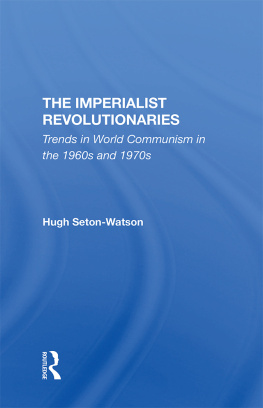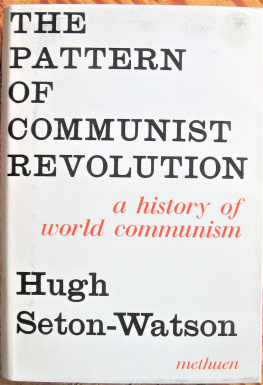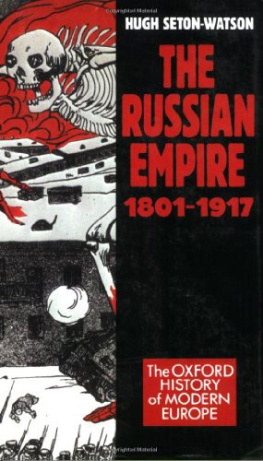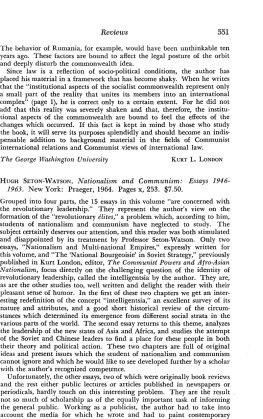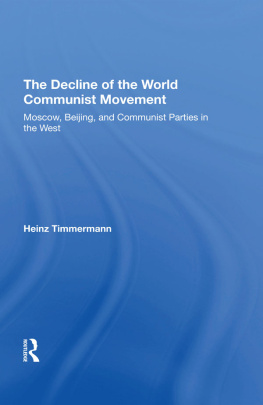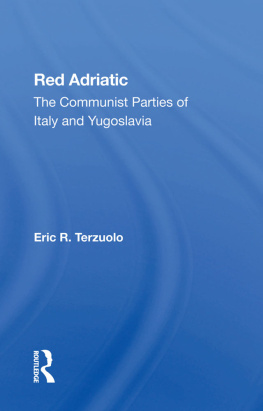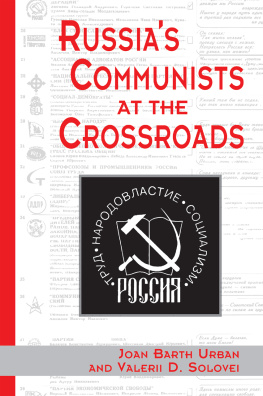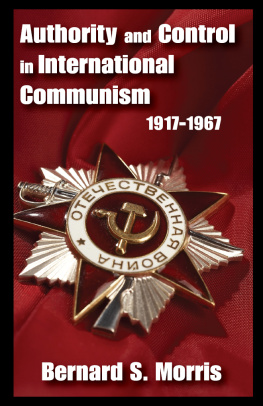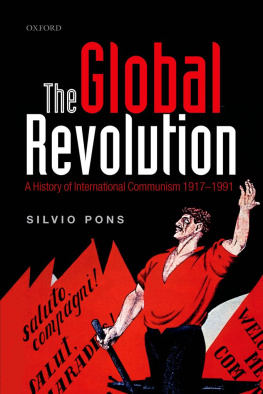THE IMPERIALIST REVOLUTIONARIES
A Westview Encore Edition
The Imperialist Revolutionaries
Trends in World Communism in the 1960s and 1970s
Hugh Seton-Watson
First published 1985 by Westview Press
Published 2019 by Routledge
52 Vanderbilt Avenue, New York, NY 10017
2 Park Square, Milton Park, Abingdon, Oxon OX14 4RN
Routledge is an imprint of the Taylor & Francis Group, an informa business
Copyright 1985 by the Board of Trustees of the Leland Stanford Junior University
All rights reserved. No part of this book may be reprinted or reproduced or utilised in any form or by any electronic, mechanical, or other means, now known or hereafter invented, including photocopying and recording, or in any information storage or retrieval system, without permission in writing from the publishers.
Notice:
Product or corporate names may be trademarks or registered trademarks, and are used only for identification and explanation without intent to infringe.
Library of Congress Catalog Card Number: 85-50944
ISBN 13: 978-0-367-29302-4 (hbk)
In its eleven consecutive volumes that have appeared to date, each comprising between 600 and 1,000 pages, the Yearbook on International Communist Affairs has offered to interested readers a wealth of data concerning communist party activities around the world. All of the facts reported in individual Yearbooks had their temporary relevance, but some remain historically more important than others.
To distinguish between the ephemeral and the lasting, and to determine which events in the fragmented yet invariably dynamic communist world were shaping history during the period 1966-1977, the Hoover Institution embarked upon a search for a particularly keen observer to prepare an analytical and highly readable survey. We believe, and trust readers will agree, that one could hardly find a more competent scholar in the Western world than Hugh Seton-Watson to handle the difficult task of writing such a book. Professor of Russian History at the School of Slavonic and East European Studies, University of London, a prolific writer and prodigious linguist, the author has gone well beyond the initial assignment. Not only has he surveyed the myriad of facts in trying to establish their hierarchical significance but has applied historical erudition to place the contemporary phenomenon of communism within a wider sociopolitical and cultural framework in given countries, regions, and continents. While discussing the behavior of parties in power or those fighting for power in many tactically differing ways, analyzing the relationship between communism and nationalism, probing reactions of social classes to ideological challenges and political battles, and finally assessing policies of the Great Powers during these turbulent years, the author has been both rigorously objective with facts and engagingly idiosyncratic in their interpretation. He has indeed been both scholarly and humanistic in the best meaning of these terms. He has tried to understand and dispassionately describe the "whys'' of undulatory communist moves, and to project these against the background of his deep concern for the survival of Western civilization.
One could say of the present volume that it represents an attempt to transform the quantitative contents of eleven Yearbooks into one qualitatively distilled essay. The propositions and conclusions made by Professor Seton-Watson concerning the efforts and failures of the "imperialist revolutionaries" in our time may be disputed, but they cannot be neglected. He has attempted to discern carefully the main trends in world communism during the 1960s and 1970s, and these trends will certainly and necessarily affect the course of world events in the future.
RICHARD F. STAAR
Coordinator of International Studies
Hoover Institution
Stanford, California
Since 1966 the Yearbook on International Communist Affairs, published by the Hoover Institution, has been an invaluable source of information for all students both in the strict sense and in a wider meaningof international politics. It has provided a detailed, systematic, and factually reliable survey of the activities of communist partiesof those struggling for power and of those already wielding it. The Yearbooks have concentrated on the political struggle: their contributors have not set out to comment on old or new expositions of Marxist-Leninist theory, or to offer new analyses of their own, though theoretical arguments between communists have been discussed. They have also not set themselves the task of exploring in depth the many and varied social and economic frameworks within which communists have operated, though from time to time they have, of course, been obliged to discuss social and economic forces.
In the summer of 1976 I was invited by Dr. Richard F. Staar, the editor of the Yearbook, to write a short book in which I would try to identify certain main trends in communist affairs during the decade of the Yearbook's publication, and to put these in some sort of historical perspective, at least in the limited sense in which practitioners of "contemporary history" can aspire to such an aim. This I undertook to do. I had a completely free hand in my choice of topics for closer study; enjoyed ideal working conditions during six weeks in California; and had the benefit of much expert advice both orally at that time and by correspondence in the subsequent year. Many were generous with their time and advice, but no one attempted to influence my interpretation. I made my own decision as to what were the main trends of the period, and this decision is explained in the first chapter of the book. My themes largely but not entirely overlap with the themes of ten years of the Yearbook. Some of the subjects covered in the Yearbook are missing from my work; and I have devoted a good deal of space to problems of class structure, historical tradition, political institutions, and national consciousness that are not usually explored in the Yearbook, because in the case of certain communist movements this was necessary in order to bring out my main themes. My time range has been somewhat longer, since I have frequently traced problems or trends back to the beginning of the 1960s, and in some cases a good deal further than this.
I have tried to expound the facts and the trends objectively, and to avoid moralizing rhetoric. Yet I have my own views, of which I am not ashamed, and they doubtless intrude themselves from time to time. Apart from this, as a large part of the material consists of polemical literature, I have been obliged to point out the fallacies. and it is virtually impossible to avoid being sometimes forced into counterpolemics.
It gives me great pleasure, in conclusion, to express my gratitude to Dr. W. Glenn Campbell, Director of the Hoover Institution, for his encouragement of my work, and to Mr. Richard T. Burress, Associate Director, who took so much trouble to ensure-such excellent working conditions. I have to thank most especially Dr. Milorad M. Drachkovitch for his generous, imaginative, and understanding cooperation. Warm thanks are also due to Dr. Myron Hedlin, whose efficient and resourceful activities as a research assistant in the summer of 1976 enormously facilitated my task. I am also extremely grateful to Dr. Lewis Gann and Dr. William Ratliff for their expert advice, and to Brian Crozier, who read my typescript here in London and made many useful comments.

